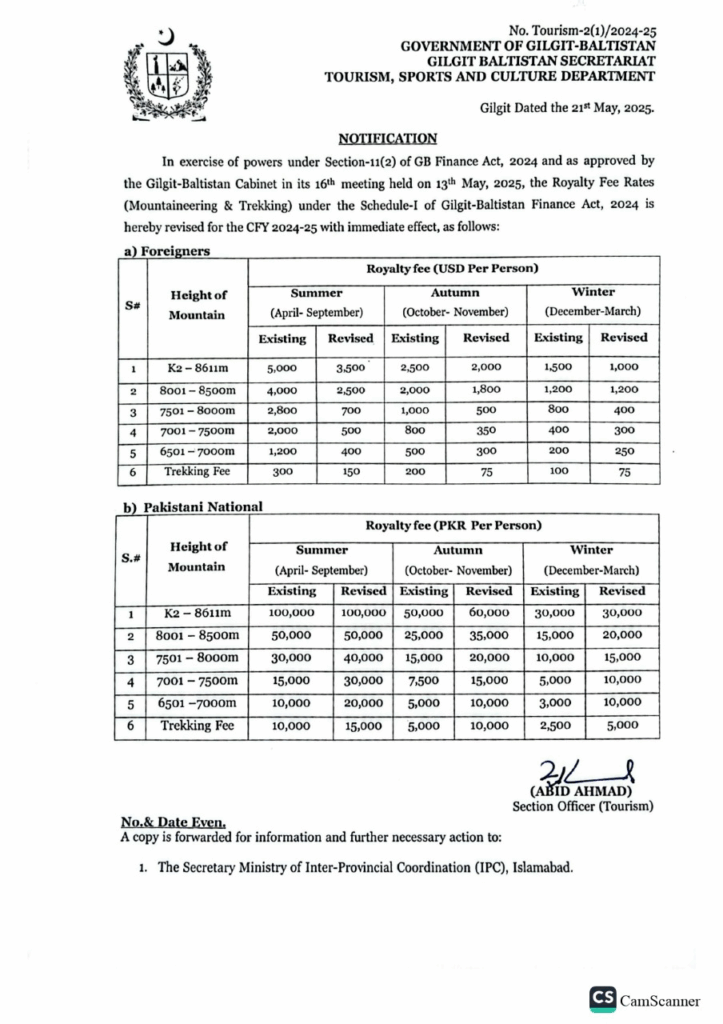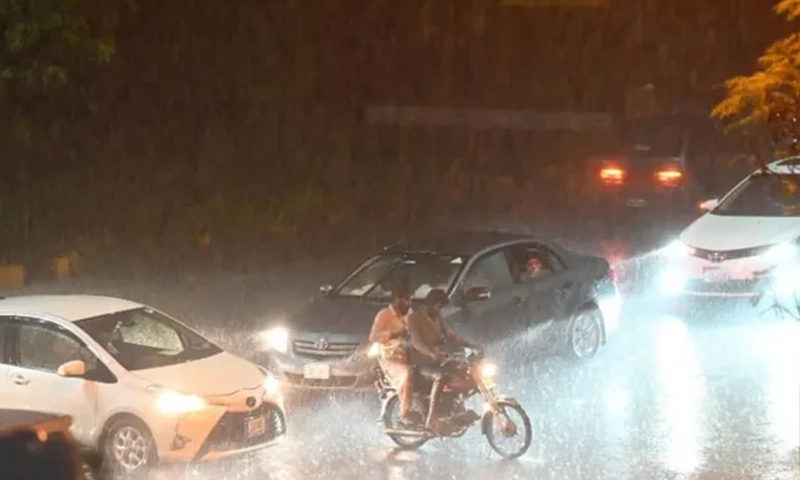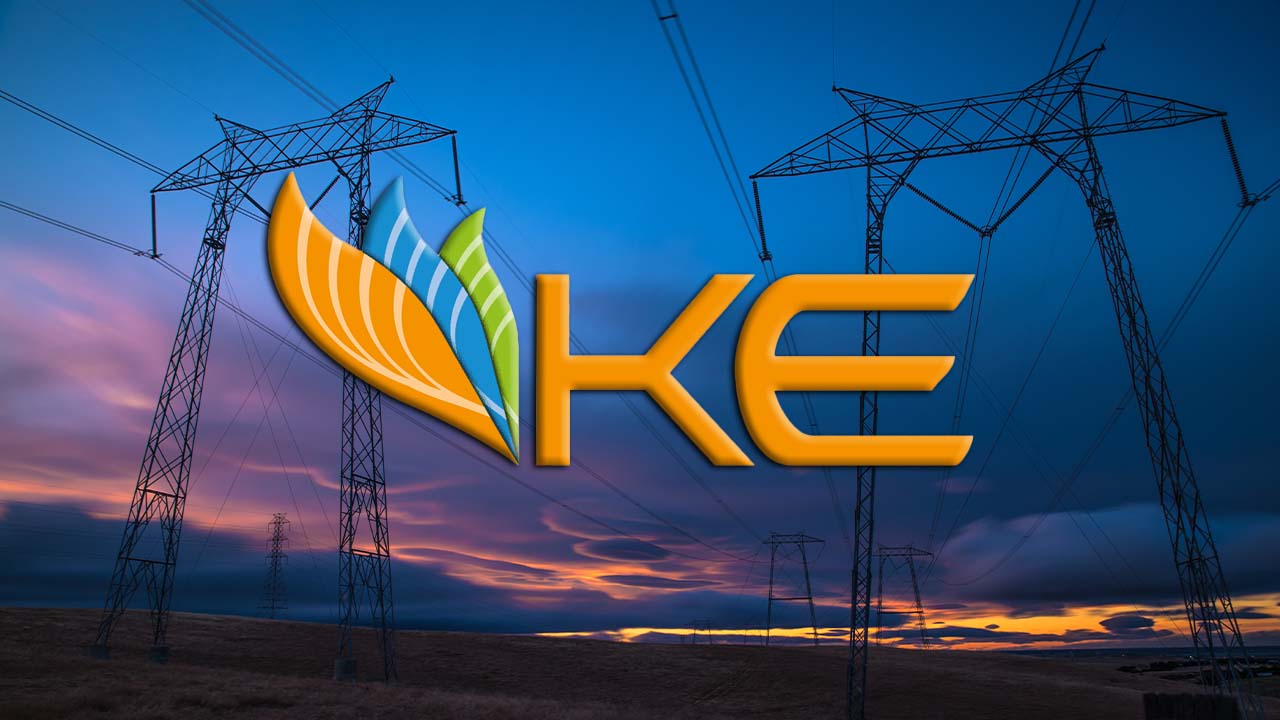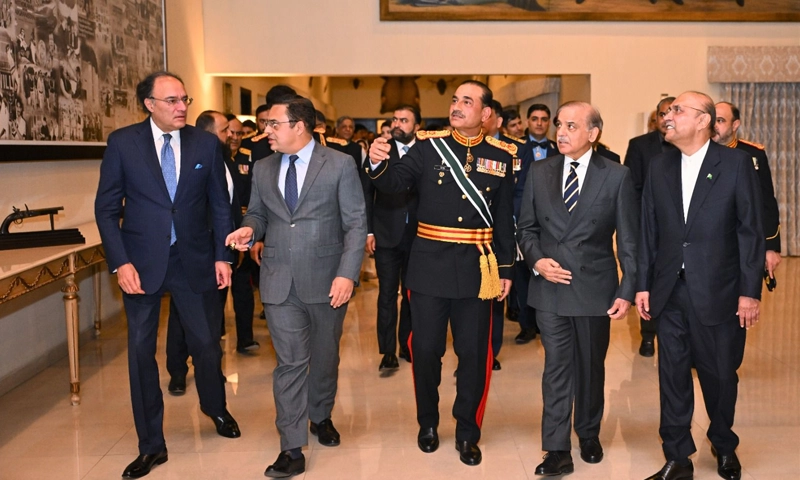- Web Desk
- 5 Hours ago

G-B notifies revised mountaineering, trekking permit fees
-

- Tanveer Abbas
- 6 Hours ago

GILGIT: Consequent upon a cabinet decision, the Gilgit-Baltistan Tourism, Sports, Culture, Archaeology & Museums Department has notified reduced permit fees for mountaineers and trekkers.
The revised fee structure, released after the 16th cabinet meeting chaired by Chief Minister Haji Gulbar Khan on May 13, 2025, comes in response to growing criticism from tourism stakeholders over a September 2024 policy shift that had nearly tripled climbing permit costs.
In September 2024, the department had abolished the previous group fee system—which applied to seven climbers—and introduced individual permits, nearly tripling costs. The move drew sharp criticism from the tourism industry.
According to a notification issued by the department, the permit fee for K2 (8611m) has been reduced from the existing $5,000 to $3,500 per person for the summer season. In the autumn, it now stands at $2,000, down from $2,500. Winter expeditions to K2 will cost climbers $1,000, compared to the earlier $1,500.
For other eight-thousanders such as Broad Peak, Gasherbrum I, Gasherbrum II, and Nanga Parbat, which fall within the 8001–8500m range, the revised fee is now $2,500 in summer, reduced from $4,000. The autumn fee is $1,800, and winter expeditions will cost $1,200 per climber.
Climbers targeting peaks between 7501m and 8000m will benefit from a sharp reduction: summer fees are now set at $700 per person, down from $2,800. Autumn rates have dropped to $500, while winter expeditions will cost $400.
For peaks in the 7001m to 7500m range, the summer fee is now $500, a drop from the earlier $2,000. Autumn and winter fees have been revised to $350 and $300 respectively.
Meanwhile, climbers on peaks between 6501m and 7000m will pay $400 in summer, $300 in autumn, and $250 in winter.
G-B cabinet slashes mountaineering permit fees after backlash
Even for trekking routes, the permit fee has been halved. The summer trekking fee is now $150, autumn $100, and winter just $75.
Revised permit rates for Pakistani nationals
The department has also revised permit fees for Pakistani nationals. For K2 (8611m), the fee remains unchanged at Rs 100,000 per person in summer, but has increased from Rs50,000 to Rs 60,000 in autumn, and is maintained at Rs30,000 in winter.
For the 8001m to 8500m range, the summer fee stays at Rs50,000, while autumn now costs Rs 35,000—up from Rs25,000. The winter fee has been increased from Rs15,000 to Rs20,000.
Peaks from 7501m to 8000m now carry a summer fee of Rs40,000, an increase from Rs30,000. The autumn and winter fees have also been revised to Rs20,000 and Rs15,000 respectively.

For 7001m to 7500m peaks, the revised summer fee has doubled to Rs30,000, autumn is now Rs15,000, and winter Rs10,000—all reflecting increases from the previous structure.
In the 6501m to 7000m category, summer fees have doubled to Rs20,000, autumn has also been updated to Rs10,000, and winter is now Rs10,000, up from Rs3,000.
The trekking fee for Pakistani nationals has been increased across all seasons. It is now Rs15,000 in summer, Rs10,000 in autumn, and Rs5,000 in winter, reflecting a rise from the previous flat rate of Rs10,000.
Tourism stakeholders welcomed the decision. While speaking to HUM News English, Pakistan Association of Tour Operators (PATO) Chairman Niaz Ahmed said they were satisfied that their “proposed and moderate” royalty fee demand had finally been accepted. He added that PATO has now withdrawn its petition filed in the Gilgit-Baltistan Chief Court against the previous fee hike, which had been negatively impacting adventure tourism.
“We tried through every possible forum to persuade the government to reconsider the increased fees, as we were concerned about the upcoming adventure tourism season. Unfortunately, the G-B bureaucracy ignored our concerns and misinformed the government, which forced us to take legal action,” he said.
Ahemd explained that once they approached the court, the G-B bureaucracy agreed to hold discussions with stakeholders. “After reaching a mutual understanding with the Tourism Department, the government delayed the cabinet meeting. We had called for an out-of-court settlement because the hike was not only hurting the adventure tourism industry but also reducing valuable dollar inflows into the country,” he added.
He emphasised that the fee increase had significantly impacted the livelihoods of local porters who depend entirely on seasonal expeditions. However, he expressed relief that an agreement was finally reached and the fees were revised downward.
“When the increased fees were first announced, many international adventurers canceled their expedition plans, as the cost had become nearly three times higher than before. With this rollback, we’re hopeful that the 2025 climbing season will see renewed enthusiasm and bookings. The damage has been done, but we will try to recover during the remainder of the season,” he said.
When asked about the revised permit fees for Pakistani climbers, which in some cases have actually increased, the PATO Chairman said that during their meeting with the G-B Tourism Director, they were requested not to push too hard on the issue of local climbers’ fees, as it would be addressed separately.
“When I received the summary, I rejected it outright. I said it was unacceptable. What fault lies with Pakistani climbers? They deserve relief too. The fee for Pakistani climbers was increased from Rs 4,000 to Rs 100,000 per person. I requested the authorities to reduce it to at least half,” he added.
Ahmed said that during a discussion with the G-B Tourism Director, a verbal assurance was given that a separate summary would be moved to reduce the permit fee for local climbers.
G-B Tourism Director Iqbal Hussain said that following the notification, five expedition and trekking groups have already applied for permits. When asked about the increase in permit fees for Pakistani nationals, he explained that the hike was implemented to help protect the environment.
“Pakistani trekkers and mountaineers are generally less mindful of environmental concerns as compared to foreigners. That’s why, to reduce footfall on the mountains and minimize ecological impact, we increased the fee. Even so, the increase is not as high as it ideally should have been,” he added.





